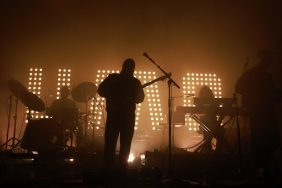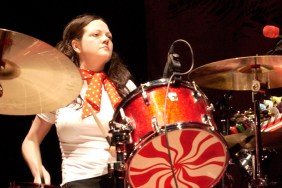The genre-bending Unknown Mortal Orchestra are without a doubt one of the most celebrated acts to be making the pilgrimage to Byron Bay for Splendour In The Grass 2013. With a few weeks to go before the festival kicks off, Music Feeds caught up with one third of UMO, main man Ruban Nielson, to speak a bit about the process behind the band’s 2013 sophomore album II which is sure to get a right flogging during their SITG performance.
Music Feeds: UMO saw you move from recording music collaboratively, as part of The Mint Chicks, to writing and producing solo. Was there any limitations or doubts about working in isolation that were overcome on II?
Ruban Nielson: Between the time I recorded the first album and II I got my own house. When I recorded the first one I didn’t have any space. I lived in this tiny one bedroom flat with my wife and son who was just a baby at the time, so I had to ask friends if I could borrow their basements when they’d go away and stuff like that. I recorded at 5 or 6 different places and I’d try to do a song a day under those conditions.
For II I had my own comfortable basement situation so I could leave my equipment set up. It sounds really basic but it made a big difference. Moving from New Zealand and leaving The Mint Chicks meant I was very much starting from scratch so those really basic things were important.
MF: You’ve described II as having a feminine energy. What do you mean by that and where do think this kind of power comes from?
RN: I suppose a lot of cultures have this idea of masculine and feminine. I was thinking a lot about feminine energy as this constant subversive thing. The energy that undermines the dominant masculine structure of most societies. Not feminism, really, but the ancient per-feminist form of feminine power. That’s why Janet Farrar the witch was on the cover. A witch is a good symbol of what I’m talking about. A woman not to be trifled with.
I think rock n roll is a really masculine thing but its only kept alive by being nourished by the feminine. It’s not like I think about any of this while I’m making a record, but more like I can see it after it’s done. The record was about the night as well. I think of the night and the moon as being associated with that ‘yin’ kind of idea.
MF: What is it about modern production that you find sexless and how have you managed to expand on UMO’s sound by only using limited recording equipment?
RN: Today people are propped up by computers when they make music. Computers are a good tool but they sound shitty. There’s this idea of lo-fi but most new records are this new kind of lo-fi: a crystal clear, empty, flat, plastic mall sound. Computers can help but so many people use them as a musical crutch. You don’t develop as an artist if you leave the training wheels on.
MF: The sound qualities of tape allow you to work for hours on end. In turn is that what you aim to achieve for the listener – music that can be listened to and lost in for hours without fear of an earache?
RN: More than hours. Years. Decades.
MF: There’s a reoccurring theme of night throughout II and yet the music has a warm glow. Is that your way of conveying your comfort and familiarity with nightlife, stemming from relentless touring, or just a function of your recording methods?
RN: It’s all tied up together.
MF: When writing lyrics you let the words come without much deliberation and it’s often a while after a song is finished that you understand its meaning. Have any new meanings surfaced or existing meanings morphed since the release of II?
RN: I started realising that this song called Opposite of Afternoon is kind of the UMO theme song. It’s the song where the subjects of the album all get tied together. That was kind of a cool thing to see. For a while I didn’t quite get what that song was all about.
MF: You’ve spoken of finding yourself in an abnormal headspace, whether it is from sleep deprivation, isolation or some other cause, when writing and recording. What is it about these kinds of mindsets that stimulates your creativity?
RN: I’m not sure. Maybe just removing yourself from the same old point of view. Sometimes I think of reality as a cube that usually looks like square because of a certain point of view. Altered states help you get a view of reality that is a little bit more revealing because you see it differently and then marry the new experience with the normal way of looking at things. I guess insanity is when you miss out that step.
MF: Are you considering a less physically and mentally taxing approach to making music?
RN: It’s not like I don’t find some perverted pleasure in living life this way. I think the main thing is that I don’t get bored. I like new experiences. New places and ideas. Sometimes they can be dark and sometimes amazing. I don’t see myself trading that for comfort in the near future.
MF: UMO will be playing Splendour In The Grass 2013. What kind of headspace do you aim to place your audience in?
RN: I just want to make people feel good, ultimately.
Unknown Mortal Orchestra will be appearing at Splendour, as well as a couple of sideshow dates with Wavves in Melbourne and Sydney.
Wavves + Unknown Mortal Orchestra tour dates
Thursday, 25th July – SOLD OUT
The Standard, Sydney
Saturday, 27th July – SOLD OUT
Corner Hotel, Melbourne












